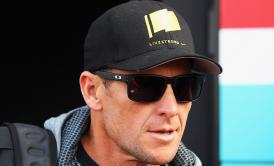Here was the big news from overnight: Lance Armstrong said late Thursday that he will drop his fight against accusations that he used performance-enhancing drugs to become one of the greatest cyclists of all time. The surprise announcement was to be quickly followed by a lifetime ban and could cost him his seven Tour de France titles and his place in his sport’s record book.
Regardless, the somewhat shocking turn of events will no doubt have a lasting impact on the legacy of a man who beat cancer and went on to become one of the world’s best known athletes by dominating a sport that in recent years has been defined as much by those athletes who were stripped of their titles as by those who earned them on their bikes.
“There comes a point in every man’s life when he has to say, ‘Enough is enough.’ For me, that time is now,” Armstrong said in a statement that called the latest doping charges against him by U.S. Anti-Doping Agency an “unconstitutional witch hunt.” He continued: “The toll this has taken on my family, and my work for our foundation and on me leads me to where I am today— finished with this nonsense.”
While Armstrong maintains his innocence, his decision to no longer contest USADA’s case against him allows the agency to move forward with plans to ban him for life from future competition. (While he had retired from cycling, he was still competing on the international triathlon circuit.)
While the quasi-governmental agency’s case included no positive drug test, the New York Times reports that it claimed to have more than 10 eyewitnesses lined up to testify that Armstrong used banned blood transfusions, blood-boosting EPO, testosterone and a handful of other drugs to earn his record-setting seven yellow jerseys. Among those expected to testify were a handful of Armstrong’s former teammates, including longtime friend George Hincapie, one of the most respected American riders in the professional peloton.
“It is a sad day for all of us who love sport and our athletic heroes,” USADA chief executive Travis Tygart, the man who led the doping investigation, said in a statement. “This is a heartbreaking example of how the win-at-all-costs culture of sport, if left unchecked, will overtake fair, safe and honest competition.”
The USADA decision clears the way for Armstrong to be stripped of all of his professional victories—along with a bronze medal he won at the 2000 Olympics—but that is not a done deal just yet. The sport’s governing body, the UCI, which has often engaged in something of a turf war with USADA over doping investigations, said Friday that it will wait for Tygart to submit a formal explanation for banning Armstrong and recommending he lose his titles, a step the UCI says the World Anti-Doping Code requires in cases “where no hearing occurs.”
